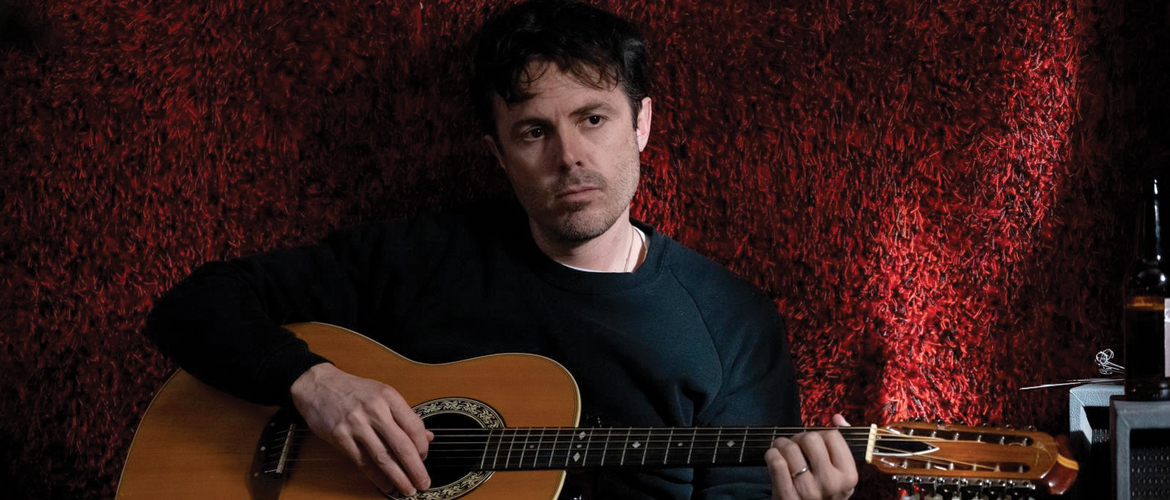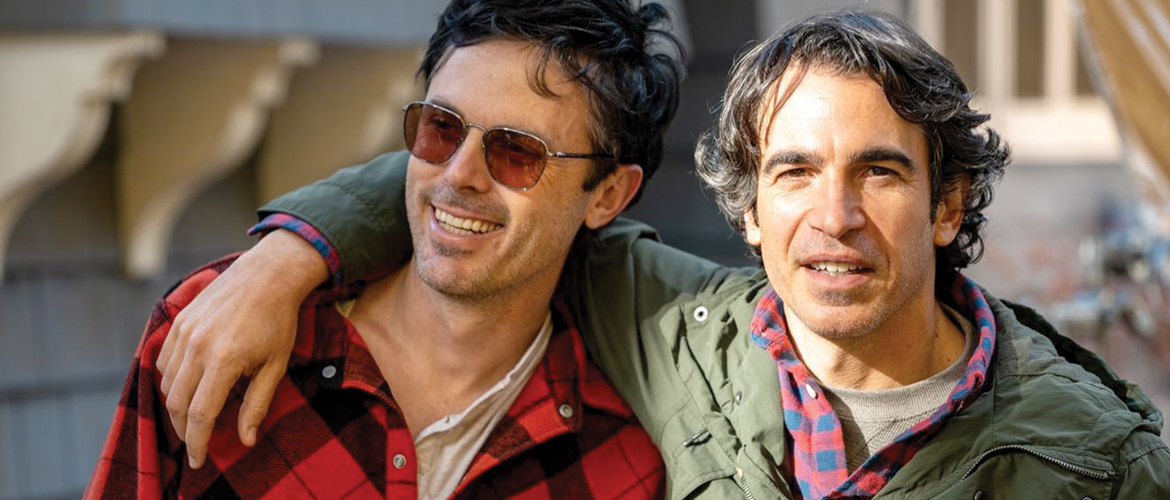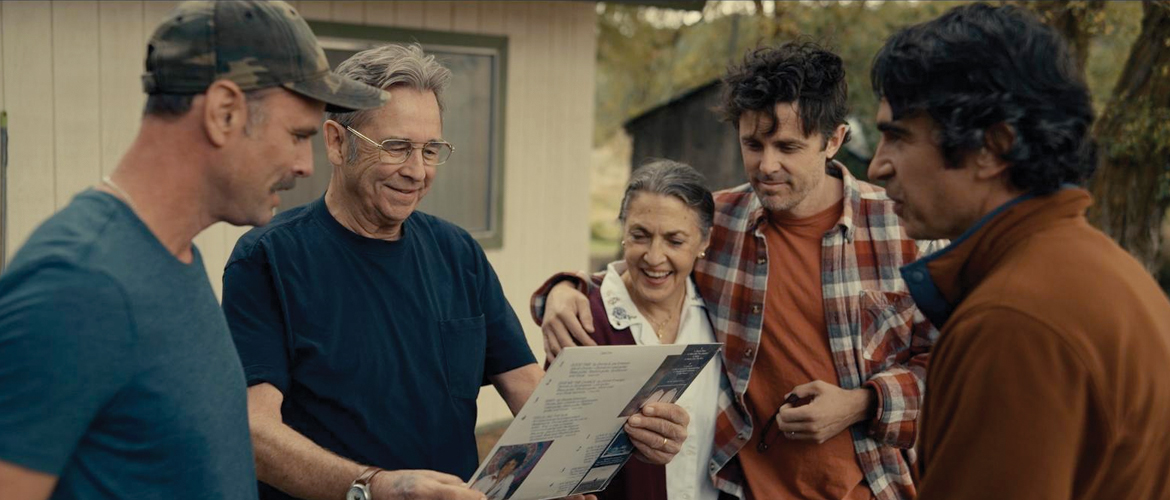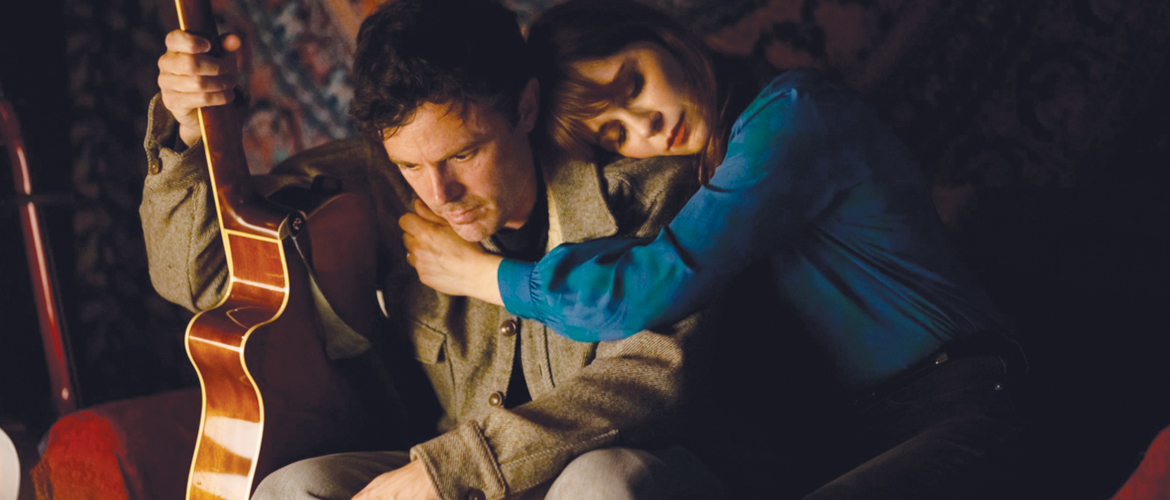By Diane Howard, Ph.D.
Dreamin’ Wild (Roadside Attractions) is a new movie that is especially needed today. It questions whether projects or people are more important. It is authentic and honest but engaging. It is a wonderfully inspirational movie based on a true story of love and redemption in an extended family. This PG-rated movie has no salacious or gratuitous elements. It is suitable for teens through older adults.
The story follows what happened when the music of singer/songwriter Donnie Emerson and his brother, which they recorded as teens, was rediscovered after thirty years of obscurity, and suddenly hailed by music critics as a lost masterpiece. While the album’s rediscovery brings hopes of second chances, it also brings to the surface long-buried, unresolved issues and emotions as Donnie, his wife Nancy, brother Joe, and father Don Sr. come to terms with the past and their newly found fame.
Written and directed by Academy Award® and Emmy® -nominated Bill Pohlad and featuring original music by Donnie Emerson, the film stars Academy Award® Winner Casey Affleck, Emmy® -nominated Zooey Deschanel, Emmy® -nominated Walton Goggins, Chris Messina, Jack Dylan Grazer and Emmy® and Grammy Award® -winning Beau Bridges. The acting is very good in this heart-felt movie, especially that of Casey Affleck as the primary character.
Donnie and Joe Emerson, musician brothers from Fruitland, Washington recorded a soulful, bluesy rock album in their teens. Although they had talent and unwavering support from their father, Don, Sr., their creative endeavor never took off — until over 30 years later, when their music was rediscovered and embraced by collectors and fans, many who considered it a masterpiece. What followed was the resurgence of a dream that had long ago been put to rest: a record deal, album release, and a family’s faith and perseverance rewarded.
At its core, Dreamin’ Wild is a layered story of love and redemption, told through the journey of the Emerson family. Donnie Emerson’s story is one of loyalty, second chances, and the possibility of dreams coming true. But it’s also about pain, regret, and the complications that the same dreams may bring.
Writer-director Bill Pohlad made his directorial debut with the award-winning feature Love & Mercy, a masterful character study of The Beach Boys’ Brian Wilson. Pohlad is also an accomplished producer of films such as The Tree of Life.
“(Dreamin’ Wild) explores faith and family, guilt and responsibility. Ultimately, it’s about healing, and we need that in our world more than ever right now. That’s why I was captivated by this story,” stated Pohlad. “I see this as a film about the fragile relationships between fathers and sons, between brothers, and about the highs and lows of pursuing any dream,” said the film’s star, Casey Affleck. “It’s also a biopic, but not in the traditional ‘This happened then this happened…’ sense, as this film is more focused on a crucial moment in the near-present, with scenes from the past haunting the film in the same way they haunt the characters. “
A music aficionado, Pohlad was instantly transfixed by the Emersons’ sound. “The heart of the movie is the music,” he noted. “‘Baby’” – their biggest hit to date – “was on a loop in my head while I was writing, and that song’s soulfulness and raw passion permeates the movie.” He continued, “There is a sense of magic running through this story. You can hear it echoing through ‘Baby.’ And you will feel it throughout Dreamin’ Wild.”
Academy Award-winning producer Jim Burke first brought the Emerson brothers’ story to Pohlad and Christa Zofcin Workman, Executive Producer and Co-President of River Road.
I had a thoughtful discussion with Donnie Emerson and Nancy Emerson, and with Bill Pohlad. Bill said that when he met Donnie Emerson and his family it was their intriguing and dynamic relationships that made him want to make this movie. Donnie said that he values all meetings, connections, relationships because God is in control and brings them about. Nancy told of the unique bond that he and his brother, Joe, have, which is depicted in this movie. Nancy said that we need to cherish each moment with other people and the connections that develop. Donnie and Nancy talked about how relationships need to be honest and simple. She talked about praying for people that the Lord brings into their lives.
“The distinctive qualities of this family were palpable and rose to the forefront,” Workman said. “‘Baby’ is one of those songs where you think you have heard it before, but you’re not quite sure, it just feels like it’s been around forever. And it was intriguing enough to convince me to go up to Spokane and visit Donnie,” Pohlad added. “I can go on and on about their relationship, which is amazing and heartfelt,” he continued. “Driving home… I’m sitting next to Donnie and he starts talking, gets more emotional. And eventually, he starts crying as he’s relating some of his history. I’ve just known this guy for a few hours, and suddenly he was pouring his heart out to me. I was hooked.”
Pohlad had not intended to write the script, but after spending time with Donnie, he felt compelled to tell his story personally. “What struck me was the parents’ unconditional love, Joe’s love for his brother, and the heartbreak in Joe’s letting go of the dream of making music with his brother so that Donnie could succeed,” added Workman, “(as well as) the artist’s journey and conflict in late discovery, manifested guilt, and the complexity surrounding the bittersweet acclaim that came 30 years later in life after Donnie’s music and talent had transformed him into a completely different person. There is so much more — the nuances and layers in this story go deep, and I believe will resonate with all of us.”
In 2020, industry vet Kim Roth joined River Road as co-president with Workman. She remembers being on set in New Orleans when Pohlad sent the script he had written. She hadn’t heard of the Emersons, but she was immediately hooked. “The unlikeliness of rural farmers in Washington recording an album with this kind of soulfulness — it was bluesy and groovy — it was hard to imagine two teenagers from that part of the world had made that sound with no kind of musical experience. That it just emanated from them was pretty extraordinary,” she said. “And of course, the story of these parents believing in their kids in this way to follow their dreams… It’s pretty remarkable.”
Dreamin’ Wild has caught the highs and lows of the American Dream. Don Sr. (Beau Bridges) believed in his sons so fiercely that he gave up hundreds of acres of family farmland to build them a recording studio. As he says in the film, it was not a risk, but an investment in his sons’ talents, a leap of faith and love. While the Emerson brothers’ journey may be unique to their family, it’s also relatable to the struggles that many endure in pursuit of their passions.
Although Pohlad was initially captivated by “Baby,” the writer-director was fascinated by teenage Donnie’s struggles ultimately giving rise to the kind of success and notoriety the music deserved. However, there was an emotional undercurrent of the story from the complex character study of Donnie and the family drama. “I can certainly relate to those feelings, so I sympathize with that. But (Donnie’s) sensitivity and the emotion, certainly all the stories that he told me over the years about different aspects of his life, I feel a connection with them,” Pohlad explained. “If there wasn’t that, there probably wouldn’t be a movie.”
Casting the Emersons was similar to the approach he used in his award-winning directorial debut Love & Mercy. Pohlad used two sets of actors to portray the characters in different time periods, with Casey Affleck playing the older Donnie Emerson and Noah Jupe playing the younger. Walton Goggins and Jack Dylan Grazer take on Donnie’s brother Joe, while Beau Bridges does double duty, playing the family patriarch in both timelines. Zooey Deschanel plays Donnie’s wife Nancy. As Donnie, Affleck plays a complicated, dedicated man who never gave up on his childhood dream of being a musician.
“Donnie was a musical prodigy lost to history, and circumstance,” said Affleck. “He created what was considered in music circles a seminal album while he was a teenager, then carried for many years the disappointment of its perceived failure, and also the weight of the sacrifices his family made in order for him to pursue that dream. That tension — of how Donnie’s work finally getting its due brings on entirely new fears of failing again – felt like a very worthy story to tell. I’m honored that I got the opportunity to be a part of it.”
Pohlad wanted to anchor the film with Affleck, known for his intensity and ability to dig deep into the emotionality of a role. Roth had worked with Affleck on Tower Heist and maintained a close relationship with the actor. “He was the kind of guy who could channel Donnie’s brand of quirkiness,” said Pohlad. “When you first meet him, you can see that there are different sides of him and he can kind of drop off into a dream world. You could really believe him when he was performing.”
This is a richly honest, authentic, and heartfelt movie with beautiful themes. A primary theme is that relationships in process, especially family ones, are more important than projects, productions, or outcomes. In adulthood, Donnie has settled for playing at weddings and working as a “band for hire” with his wife. He values meeting, connecting with others and sees moments with them as divinely appointed. He and his family have priorities that we all need.
Diane Howard, Ph.D. is a dialogue, dialect and voice-over coach, as well as a journalist who writes about the role of faith in movies and in the entertainment field. Her website is dianehoward.com.





